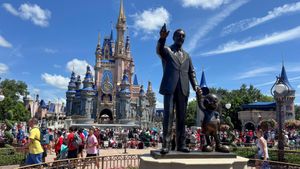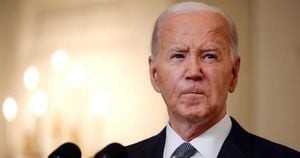Boeing's Starliner spacecraft has successfully completed its trip back to Earth, albeit with no astronauts aboard, ending yet another chapter of challenges for the company and NASA. The unmanned capsule touched down at White Sands Space Harbor in New Mexico shortly after midnight Eastern Time, marking the end of what was supposed to be a crewed mission involving NASA astronauts Butch Wilmore and Suni Williams. Instead, those two astronauts remain aboard the International Space Station (ISS), where they will stay until their planned return on SpaceX’s Crew Dragon capsule early next year.
This latest flight, which began on June 5, was particularly important for Boeing, as it was Starliner’s inaugural test flight with astronauts on board. Unfortunately, technical difficulties plagued the mission from the get-go. Shortly before its docking, several thrusters on the service module failed, prompting the need for the spacecraft's return to Earth without its intended crew. It was clearly not the triumphant test NASA had envisioned.
Steve Stich, program manager for NASA's Commercial Crew Program, addressed the media after the successful landing, noting the mix of emotions felt by the teams involved. He expressed relief at the successful landing but acknowledged the disappointment of not having Wilmore and Williams return on Starliner as planned. "There's clearly work to do, and we need to sort through the issues," Stich remarked during the post-flight briefing.
After the spacecraft undocked from the ISS, it executed autonomously during its return flight. It re-entered the atmosphere with precision, deploying parachutes to slow its descent. Although NASA officials had concerns, including worries about the stability of its thrusters during re-entry, the landing was deemed successful. Stich referred to it as "a bullseye landing," indicating satisfaction with the performance. Still, he noted, "I think we made the right decision," emphasizing the safety concerns surrounding the astronauts’ well-being.
The complications with Starliner are far from the first or the only hurdles Boeing has faced within its commercial space program. The spacecraft had suffered multiple setbacks even before this flight, with two previous uncrewed missions encountering technical malfunctions. The mission's ultimate purpose was to certify Starliner for regular crew rotation flights to the ISS, but the recent events have put the viability of Boeing's program under scrutiny.
Following the flight, NASA officials made it clear their priority was maintaining astronaut safety above all else. Officials could not overlook the failures experienced during the mission. The rising tensions between Boeing and NASA became palpable as the two organizations grappled with the harsh reality of Starliner’s performance issues. Boeing's insistence on the capsule's readiness was countered by NASA’s more cautious approach.
Stich discussed the difficult choice of sending the astronauts back home with SpaceX rather than risking another flight with Starliner. "Leaving them there was tough. It was hard to determine whether to go uncrewed or not," he said. Meanwhile, both astronauts are adapting to their unexpectedly extended stay onboard the ISS, which is now set to last approximately eight months instead of the initially planned eight days. They are participating in scientific research and keeping busy with daily exercise routines necessary for their health.
Boeing and NASA's partnership spurred off the NASA Commercial Crew Program, aimed at supporting the growth of private aerospace companies to transport astronauts to and from the ISS. Boeing was awarded $4.2 billion for its venture, whereas SpaceX received $2.6 billion. But the contrasting trajectories of each program tell different tales, with SpaceX already having successfully flown multiple missions to the ISS, including nine crewed flights, since it began operations.
With Starliner's return, Boeing must now navigate the aftermath. NASA and Boeing plan to conduct a thorough review of the capsule’s developmental and operational failures, assessing what went wrong with its propulsion system. The findings from this review could determine if substantial design changes are needed or necessitate another test flight, potentially prolonging the time it takes to certify Starliner for regular astronaut flights.
Mark Nappi, vice president and program manager at Boeing, indicated the company’s commitment to addressing these issues, stating, “We will review the data and determine the next steps for the program.” Both Stich and Nappi expressed hope for Starliner’s future and the possibility of its successful operation in upcoming missions.
The challenges faced by Boeing have not only raised questions about its capabilities and future within the aerospace industry but also added pressure as it competes with others like SpaceX. Reports allude to growing frustrations within Boeing’s ranks as they grapple with the ramifications of delays and setbacks—and the financial costs accompanying them.
While the successful landing of Starliner after such tumultuous conditions is undoubtedly positive news for Boeing, the road to recovery remains fraught with challenges. With the eyes of the aerospace community upon it, Boeing must take decisive steps to resolve the issues plaguing Starliner, ensuring it doesn't miss out on the booming commercial spaceflight sector. For astronauts Wilmore and Williams, meanwhile, patience will be key as they settle back for their extended stay above Earth, awaiting the opportunity to return on another vehicle.



